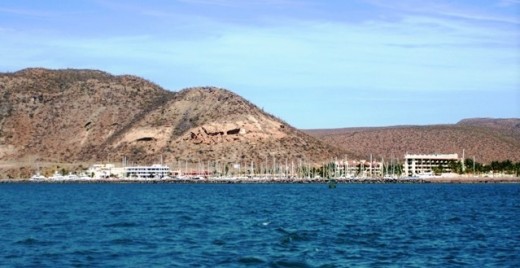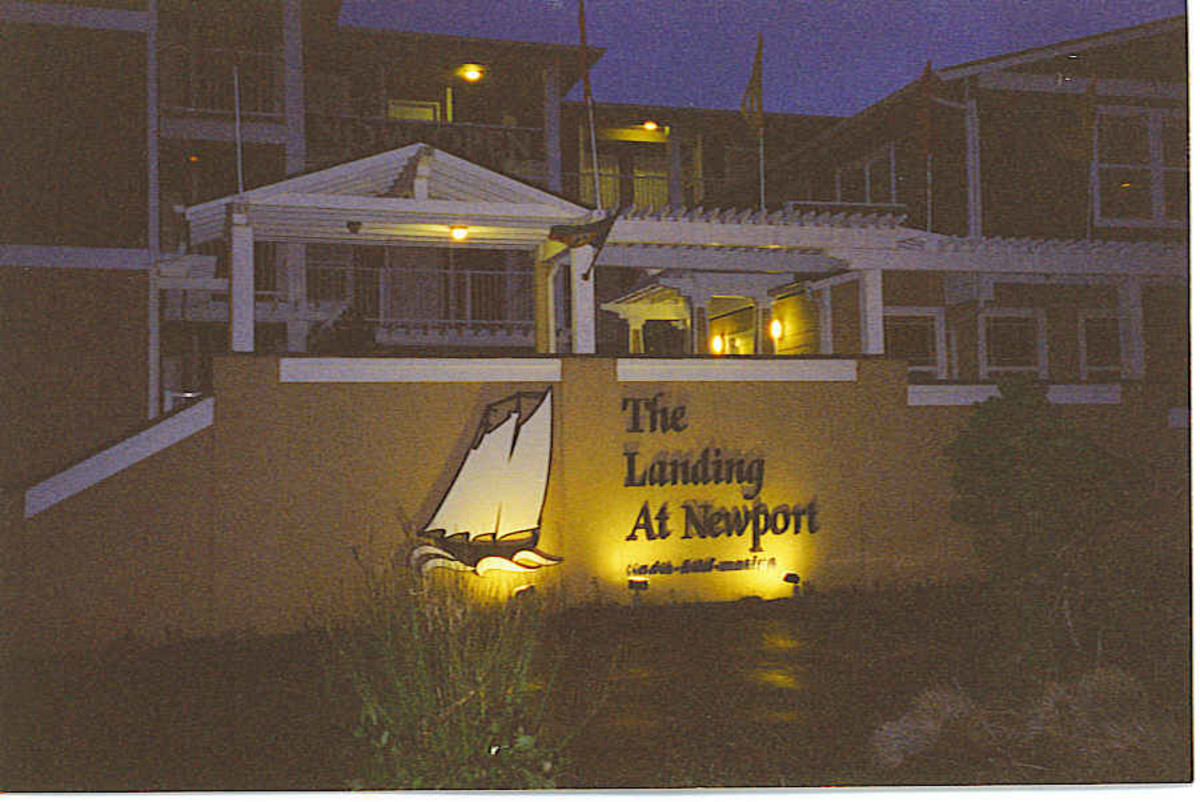- HubPages»
- Books, Literature, and Writing»
- Books & Novels»
- Nonfiction
SAILING the SEA of CORTEZ - Chapter 1.5: La Paz
Once Again into the Breach...
A week after arriving in La Paz I had completed nearly all of my preparations for our departure onto the Sea of Cortez . . . Excerpt from the journal and ship's log of the sailing vessel LOCATION. . . A single-hander's memoir of voyages, challenges, and adventures sailing the Gulf of California, the Sea of Cortez, the Baja coast, and the Mexican Riviera...
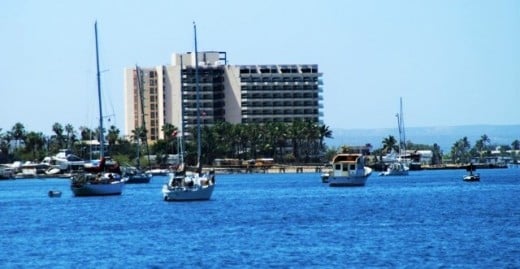
Ship's Log - s/v LOCATION
March 26, 2009 (Thursday)
I woke with ringing in my ears and a dry sticky mouth from one-too-many margaritas last night. The jam session at Ciao Molina was fun and the bartender was not shy with her pour. I could hardly refuse the two-for-one deal they offered on drinks and I stayed far longer than I intended, listening to the band and talking with other cruisers from Canada and the States . . . It was the perfect diversion for my mood!
Joel showed up promptly at eight-thirty this morning to service the engine; I was almost ready for him, and glad he was late. He started removing his shoes before boarding until I told him it wasn’t necessary. He speaks very little English, but someone in the marina office had translated my “To-Do List” for him, and we reviewed it again in broken Spanishbefore he started. He didn’t seem to mind me looking over his should as he worked. I explained that it wasn’t because I didn’t trust him — I wanted to watch what he was doing so I could learn from him. He seemed to appreciate that, and we discussed things as he progressed.
The oil change was first. He pumped the old oil out of the engine and gear box, and then replaced the fuel, oil, and air filters before pouring in new oil at the top of the engine. We discussed whether motor oil or transmission fluid was required in the gear box — I had heard it both ways — and based on his suggestion, settled on motor oil since there are no specific directions otherwise in the engine manual or on the engine block itself. He worked fast and efficiently.
At ten-thirty Joel told me he was going to lunch. That gave me time to take my three scuba tanks up to the dive shop and have them refilled with air. The dive shop at the Marina de La Paz is PADI certified and they made sure that all of my tank certifications were current. The price of air here is about the same as in the States also: fifty pesos per tank, which is about four dollars each. I looked at dive brochures and talked with one of the guys who worked there while they filled them. Then loaded the tanks into a dock cart, and went back to the boat and made myself a sandwich, still feeling the effects of the night before and hoping that some food would pull me out of it.
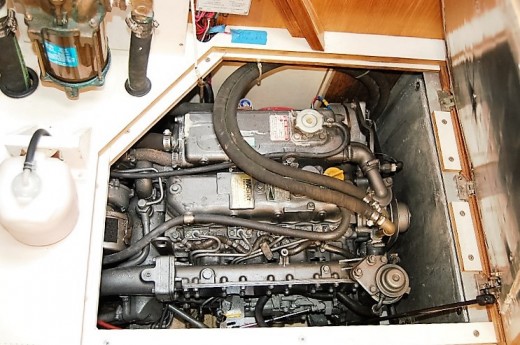
Joel was back at work by noon. He drained the engine freshwater system and replaced the old with new distilled water and coolant. Then came the hard job. The engine seemed to be too high on the motor mounts since the boat had been serviced last in Newport Beach, which caused the propeller shaft to ride too high in the packing box where it passed through the hull. My mechanic back home had claimed that the shaft was out of balance before he adjusted it, but something wasn’t right now. The packing gland rubbed on the bottom of the floorboard and the bulkhead. I had pushed it down on the shaft as much as I could to alleviate the rubbing. That hadn’t solved the problem though. It seemed the only solution was to lower the engine, which would lower the angle of the shaft and the packing gland. I was not very confident that Joel understood what was needed, but he looked at all of the components, and after some measuring and a strained explanation of his thoughts, he seemed to know what he was doing. The engine sat a little high, he agreed, but there were also loose bolts and the shaft connection was not balanced.
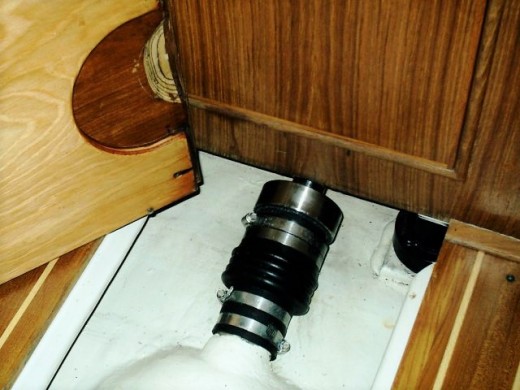
After some more measuring and discussion we got to work lowering the engine, which was definitely a two man job, keeping it balanced on the motor mounts, the shaft centered, and then fine-tuning the shaft connection, re-balancing the engine and the shaft, millimeter by millimeter, etc., etc. That little adjustment was a lot more difficult than it appeared on the surface, and we were both dirty, sweaty, and tired when we finished. Eventually he was satisfied it was done correctly, and I was happy it was done period. I tested the shaft balance by engaging the engine in gear at the dock and there were no gyrations or vibrations, and the packing gland no longer rubbed in the box . . . Perfect!
All in all, the day went very smoothly and my new Mexican ace-mechanic was done in less than five hours, about half the time I expected, and at $300 total (including parts and materials), about half the cost of the same work in the States.
After paying the marina for Joel’s work, I had no more Mexican currency and decided to walk into the city to exchange some dollars for pesos. It was late in the afternoon and I didn’t have much time before the banks would close. I was walking quickly along the Malecón toward the Banamex Bank on Boulevard Alvaro Obregon when I felt a person catching up to me.
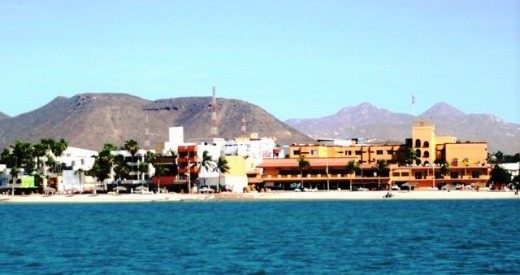
He was a young Mexican and well dressed. “Hello Señor,” he said slowing his pace next to me.
“Hola,” I answered. It was a nice afternoon, the walkway and street were busy with people and traffic, and it was La Paz after all, so I wasn’t concerned about his approach.
“I am looking for work,” he said, in very clear English. “Can you help me?”
“I’m sorry. I don’t have any work,” I replied. He was a good looking kid; I felt bad.
“Do you have a boat? I’ve done work on boats before,” he said with a tinge of desperation in his voice. “I’ve been everywhere today, applying for jobs. They all say to come back later. It is very hard to find a job now.” He kept walking along side of me, just making conversation.
“Yes, I understand,” I said, thinking about my own situation. I commented about his English; it was very good, hardly an accent.
“I’ve been in the United States. I went to school there. My mother is an American citizen. She lives in Washington. I have family there, and I have family here.”
“That’s interesting,” I said. “Why are you here now?”
“Things are bad in the United States. My wife’s family lives here in La Paz so we came here to live. It’s much cheaper, but we don’t have much money. Are you on vacation?”
“Well, sort of,” I said. “I’m going sailing for a while. I don’t have a job either, so I’m going sailing.” That sounded kind of stupid I imagined, but I didn’t have any other simple explanation.
“That sounds good. Don’t you have a family?”
“No.” I didn’t really want to discuss it. We came to a corner and stopped at a streetlight where I needed to cross to go to the bank.
“Well, I have to go home and take care of my baby,” he said. The tinge of desperation returned to his voice. “My wife has a job in a restaurant, so we have some money. But I would rather be working than taking care of the baby.”
“I understand,” I said, trying to make him believe that I did. “Good luck.” He deserved more I’m sure, and I felt sad that I couldn’t help.
“Have a nice day,” he replied, walking backwards away.
“Gracias. You to.” But I knew that he probably wasn’t having a very good day. I wished I had a job for him . . . I wished I had a job for me!
It was an interesting conversation. I don’t think it made me feel better, but it gave me some perspective… the whole world is in a shit-load of hurt, and people don’t deserve it. Some of us will eventually find our way out of this morass. In the meantime, we all go where we have to. Sometimes it looks like we’re running away, but in truth we’re just running — trying to move forward.
The lines of people at the banks are always long in the afternoon, and today people were waiting outside to get in. The Banamex Bank offered the best exchange rate, but I didn’t feel like waiting. I walked around the corner to a small window in another building that had a sign over it offering money exchange. The window was closed, but I could see a little old woman sitting inside behind tinted glass. Their exchange rate was twenty centavos less than the bank, about one and a half percent less, which was still a much better rate than I would get from a store, or a restaurant, or anyplace else.
I exchanged four hundred dollars with the little woman in the little window in the wall, and then walked back down the Malecón toward the marina. Of course, I had to stop at the Jungle Bar for a beer on my way. . . and I felt much better after two.
